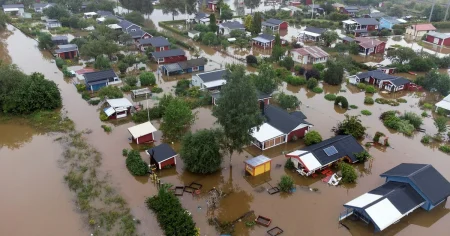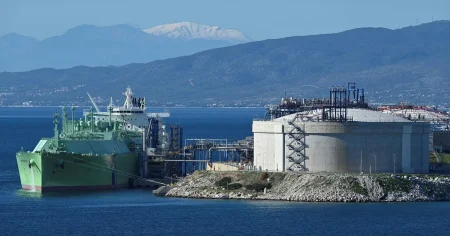The Valencian region of Spain is grappling with the aftermath of a catastrophic flood, an event of unprecedented scale that has claimed the lives of at least 211 people, with the grim expectation that the death toll will continue to rise. Prime Minister Pedro Sánchez has responded by deploying a surge of 10,000 additional soldiers and police officers to bolster the overwhelmed local authorities. The sheer magnitude of the disaster has left the region reeling, with rescue and recovery efforts hampered by the widespread devastation. The arduous task of clearing debris, restoring essential services, and, most poignantly, managing the deceased, is placing immense strain on resources and personnel. The identification process is painstakingly slow, with only 39 of the confirmed victims identified thus far, leaving families in agonizing suspense. Transport Minister Óscar Puente has described the catastrophe as unparalleled in its scope, underscoring the immense challenges facing the region.
The immediate priority is the search and rescue of those still missing, a race against time complicated by the extensive damage to infrastructure, including roads, bridges, and communication networks. The deployed forces are working tirelessly alongside local emergency responders, navigating treacherous conditions and utilizing specialized equipment to locate survivors. Simultaneously, efforts are underway to provide emergency shelter, food, and medical assistance to the thousands displaced by the floods. The psychological toll of the disaster is also immense, with survivors struggling to cope with the loss of loved ones, homes, and livelihoods. Mental health support services are being deployed alongside physical aid, aiming to address the emotional trauma inflicted by this devastating event.
The recovery phase, already underway, is expected to be lengthy and complex. The scale of the destruction requires a multi-pronged approach, encompassing infrastructure repair, economic recovery, and long-term support for affected communities. The economic impact of the floods is likely to be substantial, with businesses destroyed, agricultural lands inundated, and tourism disrupted. The government will need to implement comprehensive recovery plans, including financial aid, to support businesses, rebuild infrastructure, and revitalize the affected areas. International aid and support may also be crucial in addressing the long-term needs of the region.
The floods in Valencia serve as a stark reminder of the devastating consequences of extreme weather events, increasingly linked to climate change. The unprecedented scale of this disaster raises crucial questions about the region’s preparedness for such events and the effectiveness of existing infrastructure in mitigating their impact. Experts have pointed to the potential role of climate change in intensifying rainfall patterns and contributing to the severity of the floods. The disaster underscores the urgent need for comprehensive climate action, including investments in resilient infrastructure and strategies to mitigate the risks of future extreme weather events.
Beyond the immediate response and recovery efforts, there is a crucial need for a thorough assessment of the factors that contributed to the scale of the disaster. This includes evaluating the effectiveness of early warning systems, emergency preparedness plans, and land-use policies. Lessons learned from this devastating event should inform future planning and investments in infrastructure, ensuring that the region is better equipped to withstand similar events in the future. The investigation should also examine the potential role of human activities, such as urbanization and deforestation, in exacerbating the impact of the floods.
The road to recovery for the Valencian region will undoubtedly be long and challenging. The immediate priority remains saving lives and providing essential aid to those affected. However, the long-term recovery will require a sustained commitment from both the government and the international community. The floods have exposed vulnerabilities in infrastructure and emergency response systems, highlighting the need for comprehensive planning and investment to mitigate the risks of future disasters. This tragedy also underscores the imperative for global action on climate change, addressing the root causes of increasingly frequent and intense extreme weather events. The rebuilding process will not only focus on restoring physical infrastructure but also on supporting the emotional and psychological well-being of the affected communities, fostering resilience and ensuring a sustainable future for the region.














